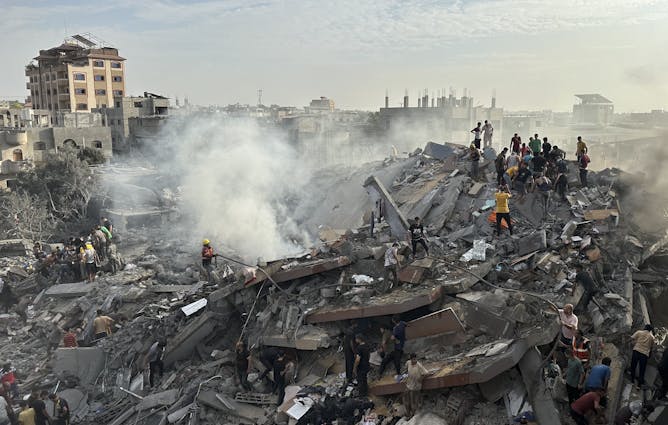|
Top headlines
Lead story
The residents of the Gaza Strip have now endured a full six months of bombardment, siege and displacement at the hands of the Israeli military. The human cost has been devastating: more than 33,000 killed, a further 1.9 million displaced and more than a million living in famine conditions.
But these are not just problems for the now. The scale of destruction will set back any ambitions that Palestinians in Gaza – and the international community – may have had about turning the enclave into anything approaching a functioning society. Dima Nazzal, research director of the Center for Health and Humanitarian Systems, lays out the challenge facing those confronted with rebuilding a war-shattered Gaza. She explains how each separate problem – health, hunger, education, housing – impacts and exacerbates the others. It is, Nazzal writes, a condition of “cascading crises.”
Nazzal adds: “And as hard as it is to look beyond the daily horrors of warfare in Gaza, there will be a time when the world starts to turn to recovery and reconstruction. The concern is that the cascading crises will amplify the human costs of this conflict for years to come.”
[ Understand what’s going on in Washington and around the world. Get our Politics Weekly newsletter. ]
|

|
Matt Williams
Senior International Editor
|
|

Palestinians look for survivors after a Israeli strike in Gaza on Oct. 31, 2023.
AP Photo/Doaa AlBaz
Dima Nazzal, Georgia Institute of Technology
The Palestinian enclave faces an interconnected series of crises that will amplify the human costs of conflict even when the bombing ends.
|
Politics + Society
|
-
Jordan Tama, American University School of International Service
Israel has historically made statements and taken actions to placate US anger without always following through. But will Biden’s threat to put conditions on aid force Israel to behave differently?
|
|
Education
|
-
Cyntrice Thomas, University of Florida
College athletes have made substantial progress in being able to get paid for the use of their name, image and likeness − except in one realm.
|
|
Environment + Energy
|
-
Randall W. Parkinson, Florida International University
A coastal scientist explains why marshes, mangroves and other wetlands can’t keep up with the effects of climate change, and how human infrastructure is making it harder for them to survive.
|
|
Science + Technology
|
-
Hao Peng, Northwestern University
This bias in science journalism seems not to be due only to pragmatic concerns about time zones or the language spoken in the country where the scientist is based.
-
Amanda Bao, Rochester Institute of Technology
A civil engineer lays out the physics behind Dali’s crash into the Francis Scott Key Bridge pier.
-
Adi Foord, University of Maryland, Baltimore County
Now out in space for more than two years, the James Webb Space Telescope is a stunningly sophisticated instrument.
|
|
Health + Medicine
|
-
Jessica L. Waters, American University; Madelyn Adams, American University
Laws such as Alabama’s controversial ruling that gives personhood rights to frozen embryos will have ripple effects on how advance directives are interpreted by doctors and the courts.
|
|
Ethics + Religion
|
-
Christopher H. Evans, Boston University
The United Methodist Church will hold its General Conference, delayed several years by the pandemic, in April 2024. The meeting comes amid a dramatic divide over LGBTQ+ rights.
|
|
Arts + Culture
|
-
Conrad Kickert, University at Buffalo; Kelly Gregg, University at Buffalo
A new study shows how front yards can serve as windows into the inner lives of their residents – and their feelings about their home, neighborhood and city.
|
|
|
|
|
|
| |
| |
| |
| |
|
|